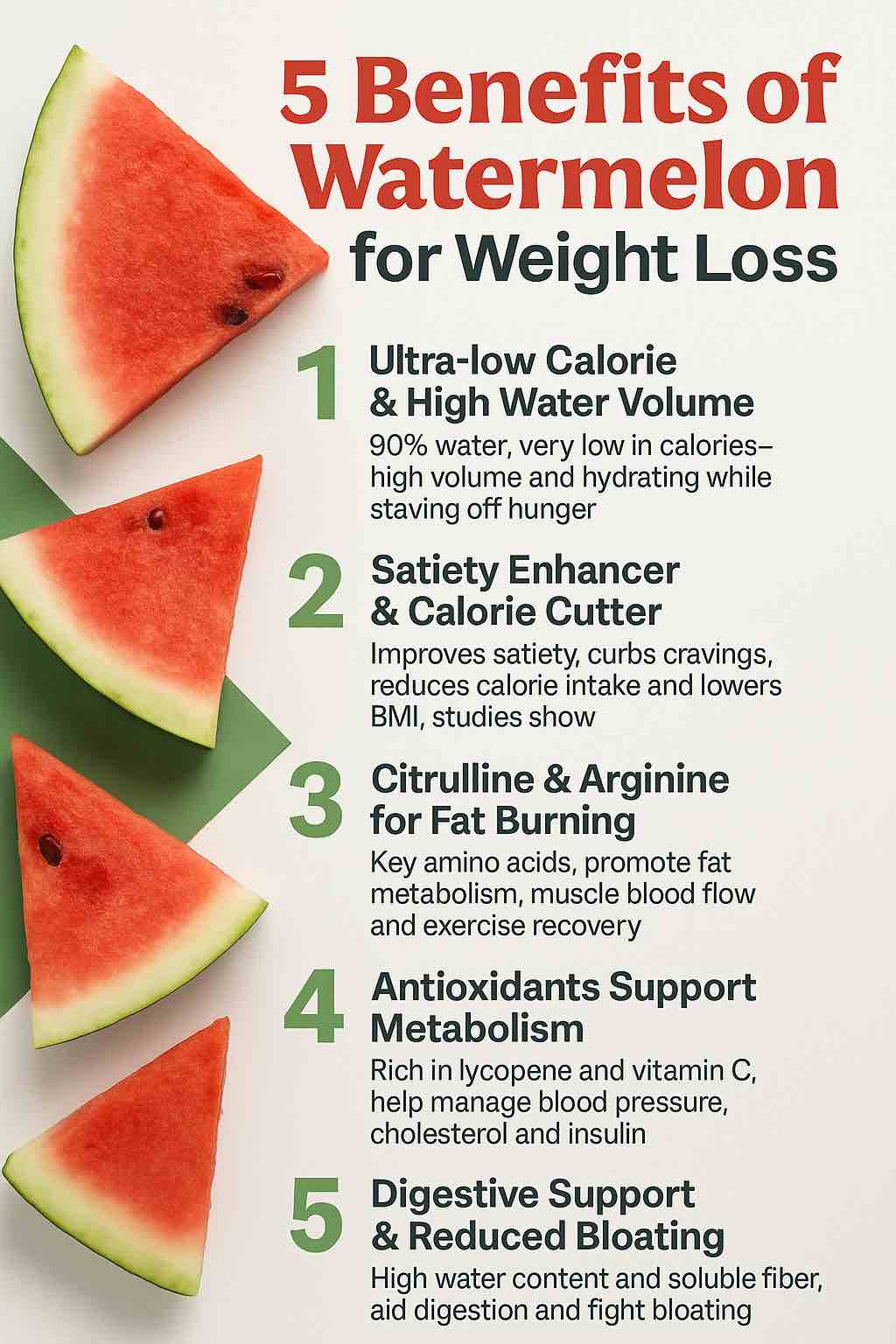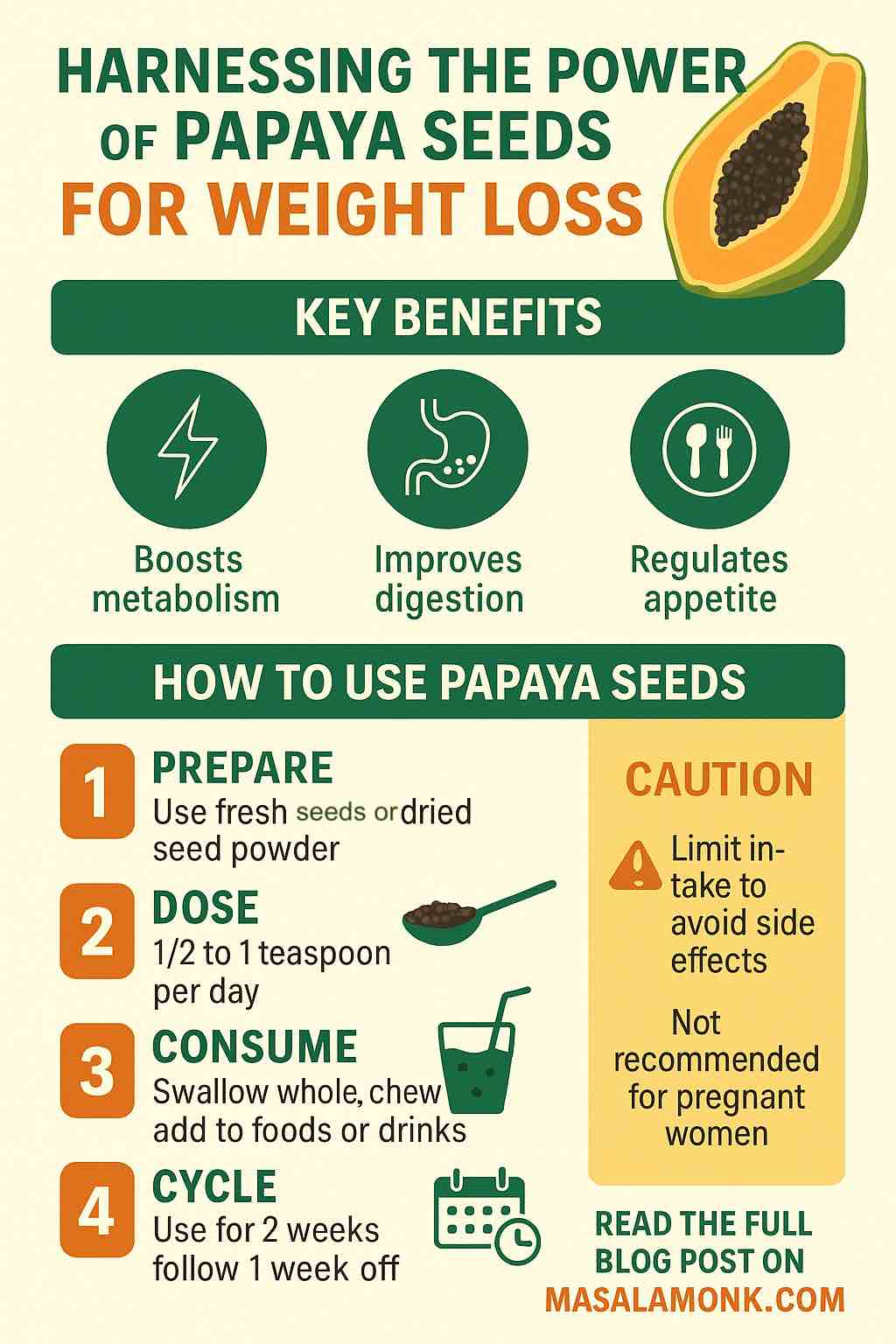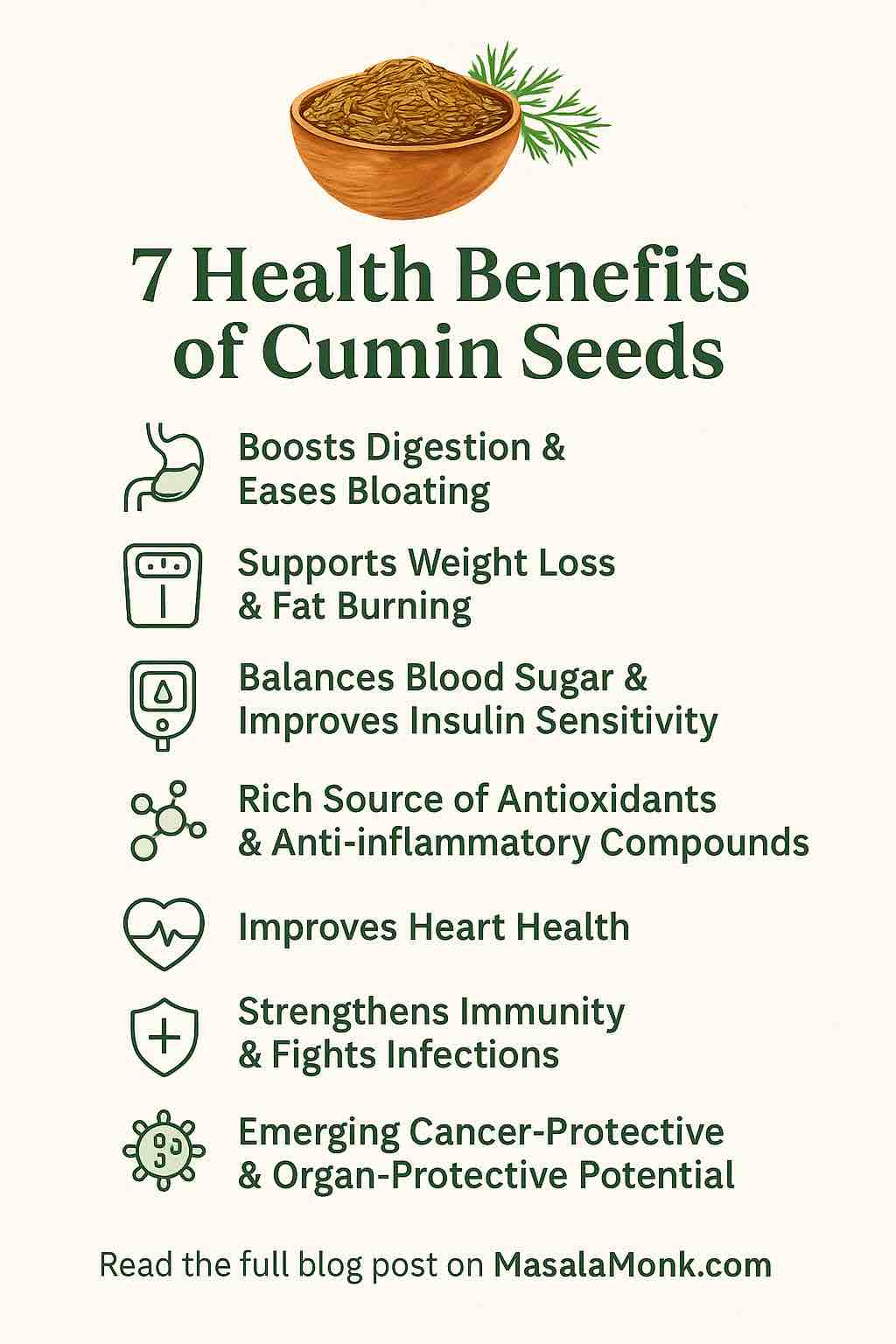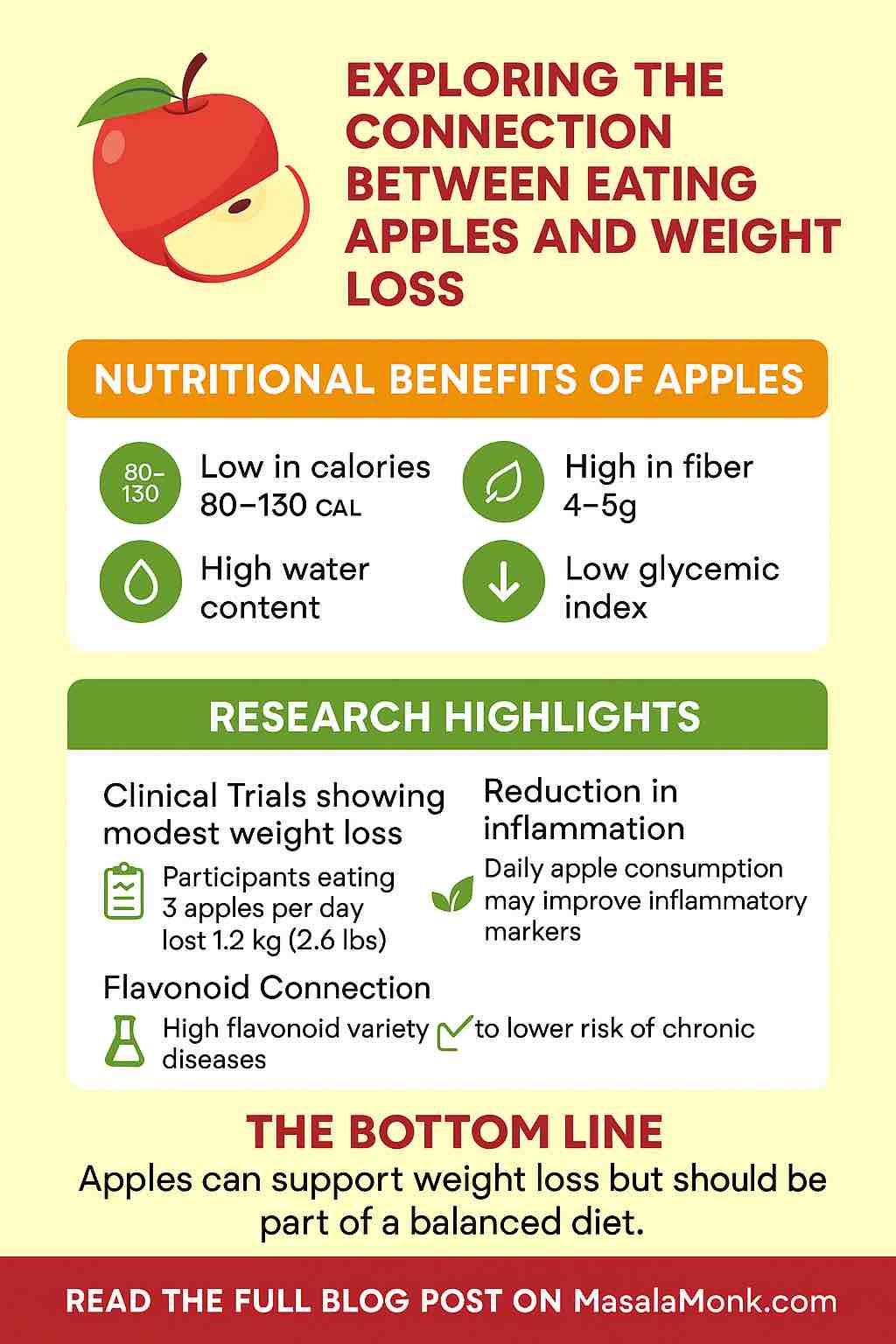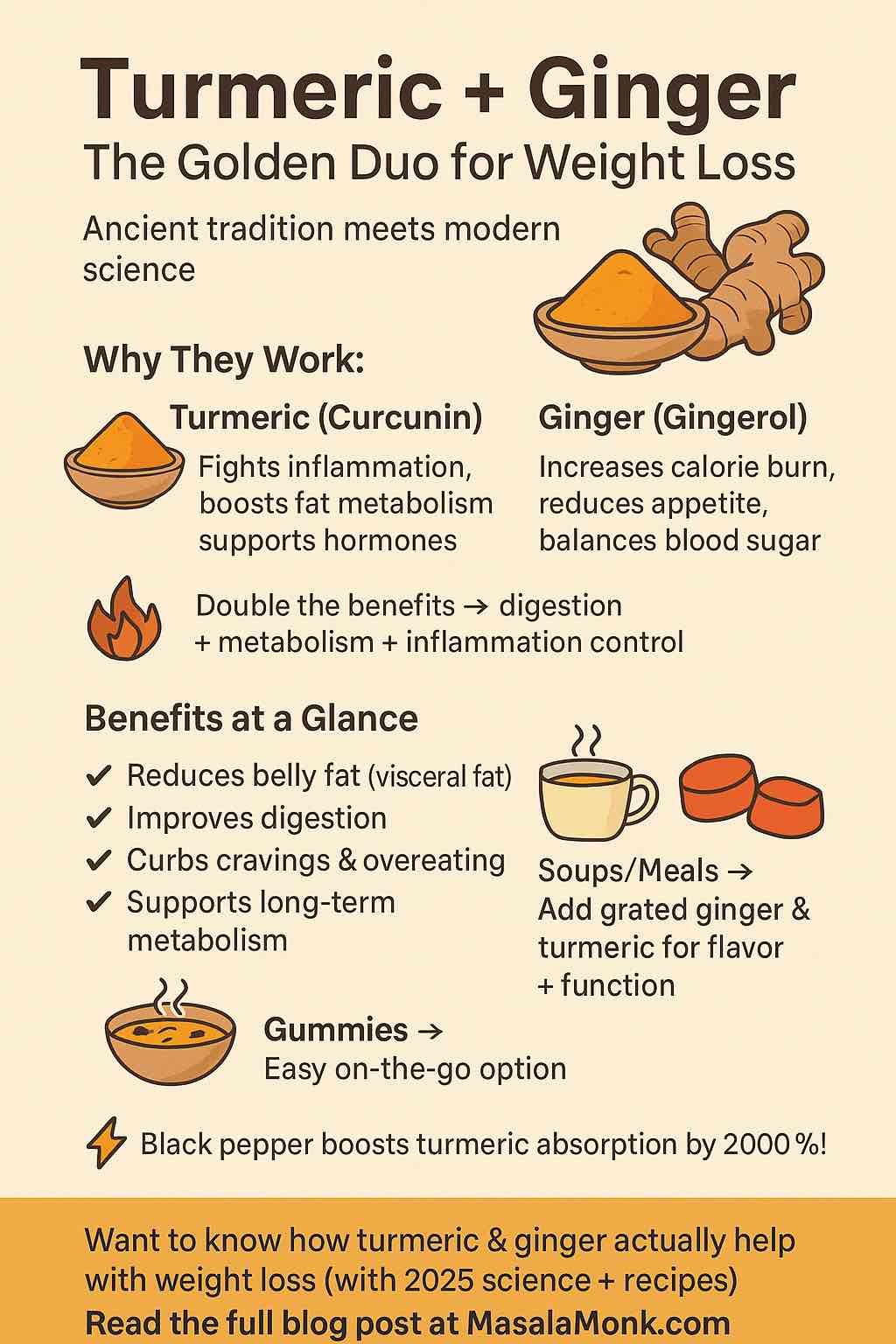
If you’ve ever stepped into an Indian kitchen, you’ve likely been greeted by the warm aroma of turmeric and ginger. They’re not just flavors—they’re traditions. Generations before us added them to curries, teas, and remedies, often without knowing the precise science, but trusting the results.
Fast forward to today, and scientists are catching up. From reducing inflammation to improving metabolism, these two humble roots are now at the center of serious research on weight management.
But the question remains: Can turmeric and ginger actually help with weight loss, or are they simply wellness buzzwords?
Turmeric: The Golden Root With Hidden Strength
Turmeric, known as haldi in India, has long been used for healing—from skin remedies to gut health. Its star compound, curcumin, is what gives turmeric its vibrant yellow color and its potent health effects.
Recent research is starting to confirm what ancient traditions always suspected: turmeric might help manage weight.
- A 2023 meta-analysis of clinical trials found that curcumin supplementation led to small but measurable reductions in body weight, BMI, and waist circumference.
- Scientists believe it works in several ways:
- By calming chronic inflammation, which makes it harder to lose weight.
- By supporting the liver and bile flow, helping the body digest and break down fats.
- By regulating hormones like adiponectin, which signals your body how to store or burn fat.
But here’s the catch: turmeric on its own doesn’t absorb well in the body. That’s why in Indian cooking, it’s almost always paired with black pepper. The pepper’s compound, piperine, can increase curcumin absorption by an incredible 2000%. Our ancestors figured this out through practice, long before labs confirmed it.
📖 Want to see how they’re combined? Check out this Turmeric, Ginger & Black Pepper Tea.
Ginger: The Root That Warms and Balances
If turmeric is the golden healer, ginger is the fiery booster. Known for its zesty heat, ginger has always been used to soothe digestion and fight nausea. But modern science is discovering something else: it may play a role in managing weight.
A 2024 review of 27 randomized trials found that ginger supplementation helped people lose body weight, lower BMI, and reduce fat percentage.
Here’s how ginger is thought to help:
- It creates a gentle thermogenic effect—essentially raising your body’s calorie burn slightly.
- It improves satiety, making you feel fuller and less likely to overeat.
- It supports blood sugar control, which reduces energy crashes and cravings.
Think of ginger as a natural spark—it doesn’t “melt fat” overnight, but it nudges your metabolism in the right direction, while also calming your digestion.
📖 Curious about practical ways to use it? Here’s a Masala Monk deep dive: Exploring the Weight Loss Benefits of Ginger and Honey.
Why Turmeric and Ginger Work Better Together
Turmeric reduces inflammation. Ginger boosts metabolism and curbs appetite. When paired, they form a dynamic duo that makes your body more balanced, less inflamed, and better at processing food.
Many traditional remedies already combine the two—be it teas, soups, or tonics. Today, researchers suggest that the synergy of anti-inflammatory (turmeric) + thermogenic (ginger) creates a more powerful effect than either alone.
📖 Learn more: The Benefits of Turmeric Ginger Cinnamon Tea.
Practical & Delicious Ways to Use Them
Here’s where science meets everyday life.
🌅 Morning Kickstart
Start your day with a warm glass of water infused with:
- ½ tsp grated ginger
- ½ tsp turmeric powder
- squeeze of lemon
- pinch of black pepper
This simple ritual not only supports digestion but also sets your metabolism in motion.
🍵 Golden Ginger Tea
Boil ginger slices in water, add turmeric powder, a dash of black pepper, and a spoon of honey. Sip in the evening to calm your system and fight inflammation.
🥤 Smoothie Booster
Blend frozen pineapple, spinach, ginger, turmeric, and coconut water for a refreshing metabolism-friendly drink.
🍲 Soups and Broths
Add grated ginger and turmeric to lentil soups or chicken broth—it makes them both healing and satisfying.
📖 See: Comfort in Every Spoonful – Turmeric & Moringa Soups.
🍬 Gummies & Snacks
Don’t have time to brew teas? Turmeric-ginger gummies are an easy way to integrate these roots into your day.
📖 Try: Turmeric & Ginger Gummies.
A Gentle Word on Expectations
It’s important to stay grounded: turmeric and ginger aren’t miracle cures. You won’t drop 5 kilos in a week by adding them to your tea. What they do is support your body—calm inflammation, improve digestion, regulate cravings, and subtly nudge metabolism.
When paired with balanced eating, exercise, and good sleep, these small nudges add up. Think of them as supportive companions on your wellness journey, not the entire path.
Safety & Precautions
- Stick to moderate doses: about 2 g of ginger daily or 800 mg of curcumin extract.
- Safe in food form; supplements should be taken with guidance.
- Pregnant or breastfeeding women, or those on blood thinners, should consult a doctor.
Final Thoughts: Ancient Roots, Modern Wellness
Turmeric and ginger connect the wisdom of our grandmothers with the evidence of modern science. They may not be magic bullets, but they’re powerful, natural allies that can make your weight-loss journey more balanced and sustainable.
✨ At Masala Monk, we celebrate this harmony—crafting turmeric-ginger blends, teas, and snacks that fit seamlessly into modern life while staying true to tradition.
📖 Explore our collection of blogs here: Masala Monk Turmeric & Ginger Wellness Articles.
❓ 10 FAQs for Turmeric & Ginger Weight Loss Blog
1. Does turmeric and ginger really help with weight loss?
Yes, studies suggest both turmeric (curcumin) and ginger may support modest reductions in body weight, BMI, and waist circumference. They work best alongside a balanced diet and regular exercise.
2. How do turmeric and ginger help with weight loss?
Turmeric reduces inflammation and regulates fat metabolism, while ginger boosts thermogenesis (calorie burning), improves satiety, and helps control blood sugar. Together, they support a healthier metabolic environment.
3. Can turmeric and ginger reduce belly fat?
Evidence shows they may help reduce visceral fat (belly fat) by lowering inflammation and improving hormone balance. They’re not quick fixes, but they can complement diet and lifestyle changes.
4. What’s the best way to take turmeric and ginger for weight loss?
The most effective ways are teas, smoothies, soups, and cooking with them daily. Supplements are also used in studies, but food-based forms are safer and easier for long-term use.
5. Do I need black pepper with turmeric?
Yes. Curcumin (turmeric’s active compound) has very low absorption on its own. Pairing with black pepper (piperine) can boost absorption by up to 2000%.
6. How much turmeric and ginger should I consume daily?
Clinical studies suggest around 2 grams of ginger and 500–800 mg of curcumin extract daily. In home cooking, ½–1 tsp turmeric powder and ½–1 inch fresh ginger root are safe starting points.
7. When should I drink turmeric and ginger tea?
Morning on an empty stomach (to boost metabolism) or in the evening (to calm digestion and inflammation). Consistency matters more than timing.
8. Are turmeric and ginger safe for everyone?
Generally safe in food amounts. However, those who are pregnant, breastfeeding, or taking blood thinners should consult a doctor before using supplements or high doses.
9. How long does it take to see results?
Don’t expect overnight changes. Research shows benefits appear over 8–12 weeks of consistent use, especially when combined with healthy eating and exercise.
10. Can I combine turmeric and ginger with other weight-loss ingredients?
Yes. They work well with cinnamon (blood sugar control), cayenne pepper (thermogenesis), and honey or lemon for flavor and added benefits.

